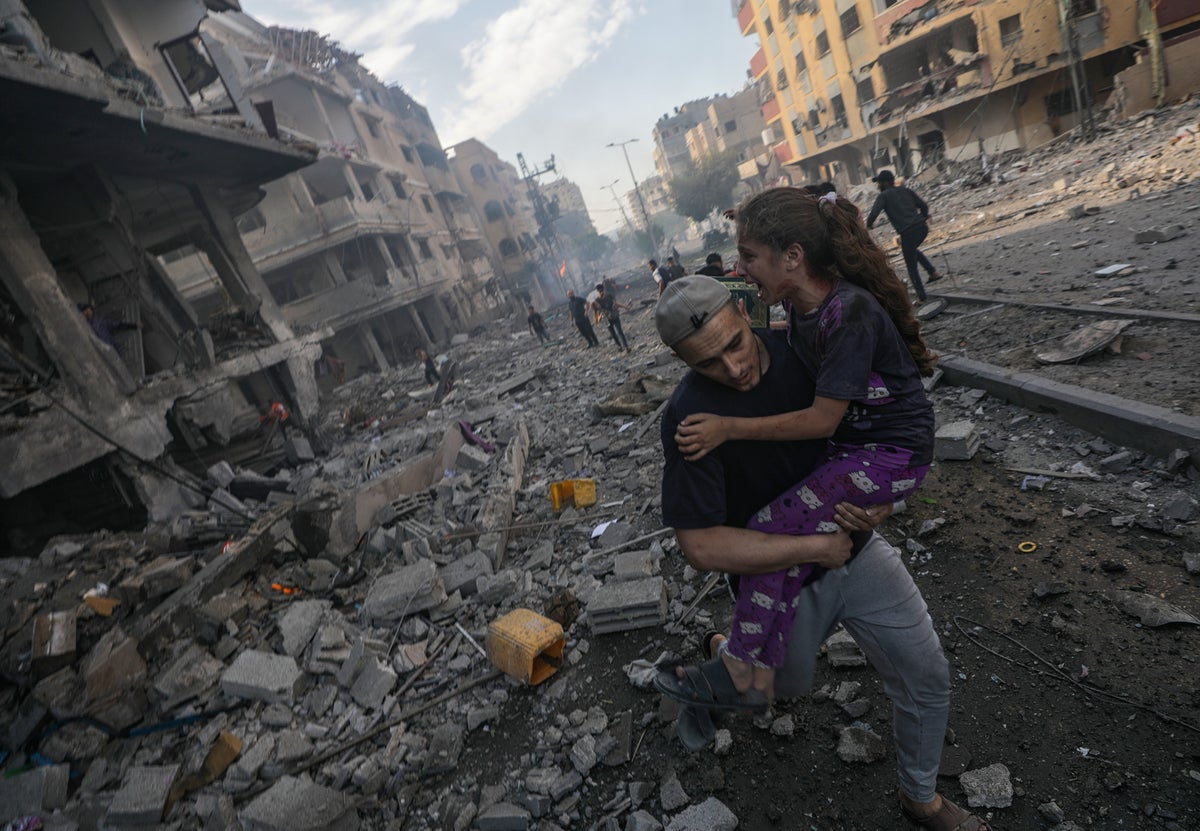
As desperately needed humanitarian aid trucks trickle through the only crossing into Gaza, President Joe Biden is reportedly pressing Israel to delay ground attacks of the occupied Palestinian territory.
US officials are in a race alongside international partners and embassies to secure the release of dozens of hostages kidnapped by Hamas militants two weeks ago. Hamas attacks on 7 October killed more than 1,400 Israelis while more than 4,300 Palestinians have been killed in Israel’s retaliatory bombardments and airstrikes.
Israel is now preparing troops for a ground assault on Gaza which could significantly complicate hostage negotiations and the delivery of aid to more than two million Palestinians trapped in the region.
President Biden and Israel’s Prime Minister Benjamin Netanyahu spoke on Sunday and “affirmed that there will now be continued flow of this critical assistance into Gaza”.
Aid convoys passed through the Rafah crossing on the Gaza-Egypt border this weekend carrying food, water, medicine and other critically needed supplies amid a deepening humanitarian crisis in the region.
Mr Biden and Mr Netanyahu also discussed the recent release of two Israeli-American hostages and “ongoing efforts to secure the release of all the remaining hostages taken by Hamas – including Us citizens – and to provide for safe passage for US citizens and other civilians in Gaza who wish to depart,” according to the White House.
Israel’s support for diplomatic efforts to convince Hamas to release hostages and allow aid to flow through Gaza’s southern border with Egypt could delay a looming ground war.
The Biden administration has “pressed Israeli leadership to delay because of progress on the hostage front” and ongoing need to move aid into Gaza, according to CNN, citing sources familiar with the discussions. The Independent has requested comment from the White House.
Hundreds of thousands of Gaza residents have been displaced and the Israeli blockade has left food, water, fuel and electricity supplies dwindling amid Israel’s ongoing airstrikes.
“The situation is catastrophic in Gaza right now. There has been no food, no water, no electricity,” Cindy McCain, executive director of the United Nations World Food Programme, told ABC Newson Sunday. “Starvation and the lack of food is a security issue.”
A truck caravan carries aid into Gaza through the Rafah border crossing with Egypt on 22 October— (AFP via Getty Images)
US Secretary of State Antony Blinken was asked directly if the US had been in talks with Israel about a delay in its ground operations into Gaza. He told NBC’s Meet the Press on Sunday that the Biden administration continues to talk with Israeli officials about its military plans but stressed that decisions remain in Israel’s hands.
“We are not in the business of second guessing what they’re doing,” he said. “We are talking to them on a regular basis about how they do it. It’s vitally important that every measure be taken to protect civilians, that humanitarian assistance gets in to people who are caught in this cross fire of Hamas’s making.”
He said he remains “hopeful” for the release of more hostages.
Mr Blinken also told CBS News Face the Nation that Hamas was blocking “several hundred Americans and other nationalities, other civilians, from other countries, who want to leave Gaza.”
“We’ve had people come to Rafah, the crossing with Egypt. And to date, at least, Hamas has blocked them from leaving,” he said.
The US is increasing its military personnel and equipment in the Middle East over concerns about “potential escalation” from nearby states in the region, US Defense Secretary Lloyd Austin said on Sunday.
“What we’re seeing is a prospect of a significant escalation of attacks on our troops and our people throughout the region, and because of that, we’re going to do what’s necessary to make sure that our troops are … in a good position, and they’re protected, and that we have the ability to respond,” he said on ABC’s This Week.
Secretary Austin said he has encouraged Israeli defence officials “to conduct their operations in accordance with the law of war”.
“We encourage them at every opportunity … to make sure that we’re accounting for those civilians that are in the battle space, that were providing corridors for them to leave the battle space if necessary, and that they’re allowing humanitarian assistance to get into that space as well,” he added.
A man carries a wounded girl following an airstrike in Gaza on 21 October.— (EPA)
Israeli forces have clashed with Lebanese militant group Hezbollah along Israel’s northern border with Lebanon. Hezbollah’s deputy leader Sheikh Naim Kassem said the group is “trying to weaken the Israeli enemy and let them know that we are ready” to join fighting, should Israel launch its ground invasion of Gaza.
Iran’s Foreign Minister Hossein Amir-Abdollahian also warned the US and Israel that “if crimes against humanity do not stop immediately, there is the possibility at any moment that the region will go out of control”.
During a press conference in Tehran on Sunday, he called the Middle East a “powder keg”, according to quotes from state-aligned Tasnim News Agency.
“Any miscalculation in continuing genocide and forced displacement can have serious and bitter consequences, both in the region and for the warmongers,” he said.







